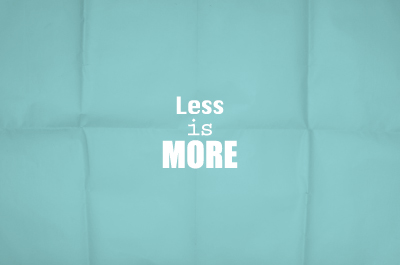Article in brief: The author explains the continuous journey of deliverables in life. Through 3 simple guidelines, he shows the reader how perfection is best pursuit through simple phases of imperfection.

What’s amazing about life is that every person embarks on a journey. In this journey, we have responsibilities to ourselves, to others and usually we have to deliver results. However, what people differ in is their understanding of these results whether they are at the work place, in a relationship, or even in following the requirements of a religion. To some people, submitting an unformatted excel sheet to an investment associate, not buying the correct type of washing detergent for their spouses, or praying significantly later than the prescribed times seem completely normal. Whereas to others, perfecting every element in every deliverable is more important to the extent of even delaying the results. In this example it would translate to not submitting an investment sheet, not buying the detergent, or not praying at all.
Although communication has a big role to play in managing expectations, I was looking for a more objective way to overcome these differences in mindsets. After attending a lecture on change management in Ramadan, I started to contemplate how differences arise in those contexts, why this leads to the creation of nothing but delays, and how they can be streamlined towards productive results. The reason I specify the word “productive” is because without energy expended into creating actual results there would only be plans to produce without anything real or tangible.
As always, my inspiration came from Islam, where mankind is mandated to perfect their deeds. However, this perfection is ought to be attained through a series of stages as was seen in the stages of revelation of the Holy Quran and establishment of the Islamic Nation.
“Allah (SWT) loves if any of you has done a deed to perfect it”.
– The Prophet Muhammad (Peace be Upon Him) (Narrated by: Tabarani, 901, Hathami, 98/4, & Al-Siyouti, 5232
Therefore, the focus now shifts from managing the communication between parties, which can be very subjective, to a balancing act in which perfection is attained through periodic stages of imperfection. In my opinion, following three simple steps can smooth this journey and ensure satisfactory deliverables to all parties in any application in life.
First, it is important to begin and take initiative towards producing an outcome. This outcome need not be perfect but should have some minimal requirements that meet the basic expectations such that it is sufficient to be deployed or delivered as a first time initiative. In other words, “it should do the trick”. Eric Ries, a Silicon Valley entrepreneur and author of “The Lean Startup”, refers to this minimal outcome as the Minimum Viable Product. In our example, this would mean the submission of a work sheet that calculates the investment factors correctly, the purchase of a detergent that will get the laundry done for the day, and the completion of prayer albeit late.
Second, there needs to be the intention of continuous improvement and the desire to implement it through a structured action plan. This plan should be fueled by data collection in the form of feedback. In our example, there would be an intention to format the work sheet in a presentable manner as per the feedback from the associate, to return to the store at a later stage to buy the correct detergent as per your spouse’s preference, and to try harder to pray on time as per the mandated standards. Such is also the case in Islam, where continuous improvement is recommended not only through clear orders for itqan (attaining perfection) but also through Quran verses implying repentance and replacement of evil with good (Maeda:39, Hud:3, etc).
Third, it is important we understand and manage our resources wisely to attain the final element through small yet effective steps. This could be periodic phases of attainment of perfection. In our example, this could mean a series of submissions; such as, some for layout formatting and others for more complex calculations, a learning process that will begin with detergent and then other items, and adjusting a few prayer times before others.
In my opinion, the establishment of great companies, relationships, as well as products, have all followed, to some level, a combination of these three steps. Examples include, cellular telephony technology development, establishment of multinational companies, and fixing of broken marriages.
In summation, the journey of life is all about deliverables to oneself or others. These deliverables have different standards between different individuals that lead to delays or to the creation of “nothing but damage”. In order to minimize this, I believe, the above 3 points will allow the perfection sought to be achieved through simple phases of imperfection.




سبحان الله، this is exatcly the same mechanism i followed couple of years ago, in order to improve praying fajr prayers on time and then in the masjid, ofcourse with Allah's help and the strength he gave me to be patient, الحمد لله رب العالمين
Thanks a million mohammed for sharing this wonderful advice, i think everybody in our community and the UAE should read this.
🙂
A very beautiful concept, it shows the essence of the Islamic civilization. It’s important to note that our religion advocates progress, actions, respect for time, and the constant pursuit of Itqan/Ihsan (perfection or excellence). Keeping this as the ultimate goal, one will only achieve this level of mastery when the heart is clean. Associating deliverables with only materialistic endeavors in not sustainable in the long term at all. This Nia (or heart purity) is what I would describe as unrestrained passion, which is instrumental for perfection of the greater good.
Verily, deeds are only with intentions. Indeed, every person will get rewarded only for what they intended. …
Source: Sahih Bukhari 1, Grade: Sahih